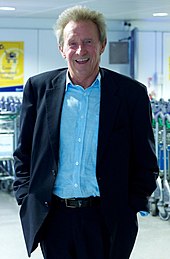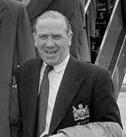Manchester derby
[4][5] The first meeting between the clubs to take place at the highest level of English football occurred in December 1906, a 3–0 City win in a First Division match for which the gate receipts exceeded £1,000, a very large figure for the era.
[6] At this time City were suffering the after-effects of a financial scandal in which the club were found guilty of making off-balance sheet payments to players.
The first derby of the 1973–74 season saw Mike Doyle and Lou Macari each receive a red card in a dour contest which finished 0–0 at Maine Road.
Although City finished 15th in the league this season, they did come to Old Trafford on 22 March 1986 and hold the hosts to a 2–2 draw, costing them two vital points as their title hopes continued to fade.
The league clash at Old Trafford came on 7 March 1987, which United won 2–0 to continue their improvement in form under Ferguson and push City closer to eventual relegation.
[17] The 1980s ended on a high note for City as they won promotion back to the First Division in 1989 and were paired with United for the derby match at Maine Road on 23 September 1989, just weeks into the 1989–90 season.
Making his United debut on that day was new signing Eric Cantona, who would go on to score eight goals in Manchester derbies over the next four seasons – the first in the return match at Maine Road that March which ended in a 1–1 draw.
In his autobiography, published in 2002, Keane admitted that the challenge was a premeditated attempt to injure, an admission which resulted in a £150,000 fine and a five-match ban during the autumn of that year.
Goater also had a second goal disallowed for handball, which would have handed City their first derby double over United since 1970 and their first win at Old Trafford since the "Denis Law game" of 1974.
Controversy was generated prior to the start of the 2009–10 season, when City signed Carlos Tevez after his contract with United ended and erected a billboard reading "Welcome to Manchester" at the top of Deansgate.
United went 2–0 up in the second leg via Paul Scholes and Michael Carrick before Tevez made it 2–1, levelling the tie and setting the game up for extra time.
[24] There was also a spat between City boss Roberto Mancini and Sir Alex Ferguson after a challenge on Danny Welbeck by Nigel de Jong.
Robin van Persie scored from a free kick that took a deflection off of Samir Nasri in the 92nd minute, to seal the win and three points in the league.
United won the second derby of the season, hosted at the City of Manchester Stadium, after Marcus Rashford scored the only goal of the game at the 16-minute mark.
Played at Old Trafford, goals from Anthony Martial and Scott McTominay completed United's first league double over City since 2009–10 and proved to be their last home match to be watched by spectators before the restrictions caused by the COVID-19 pandemic started.
[41] In March 2021, United had their second successive league win at City for the first time since 2010, with another 2–0 victory and goals from Bruno Fernandes and Luke Shaw.
In the 2023–24 season, City beat United 3–0 away in October 2023 following goals from Haaland and Foden and then completed the double over their rivals by winning 3–1 at home in March.
[46][47] Although United fans currently view Liverpool as their main rivals,[51] the rivalry between the two Manchester clubs intensified as football became tribal in the 1960s and 1970s, and strengthened again in the early 2010s with City's emergence as one of the top teams in England.
United beat City 7–1 in a War League match at Maine Road on 14 April 1941, but this is not considered an official fixture and thus the result is not counted as the biggest win in the derby.
The largest attendance for a Manchester derby was 78,000 on 20 September 1947,[71] a time when both clubs were playing at Maine Road, as Old Trafford was being repaired following bomb damage sustained in the Second World War.
A large number of non-competitive Manchester derbies have taken place, including the first match between the two sides' precursors, Newton Heath and St Mark's, in November 1881.
Matches between non-first-team sides representing the Manchester clubs also have an element of rivalry, with occasions when the reserve teams meet sometimes referred to as "mini-derbies".
[80] A Manchester derby had been scheduled to take place in Beijing, China a year earlier as part of the 2016 International Champions Cup, but was cancelled due to extreme weather conditions.
During the 1905–06 season City became embroiled in a financial scandal, which resulted in the suspension of seventeen players,[92] including most of the team that had won the 1904 FA Cup final.
In 1974, he scored the winner for City at Old Trafford in a game that condemned United to relegation, Law did not celebrate the goal and walked off the field with his head down when substituted.
Following retirement, Kidd became assistant manager to Sir Alex Ferguson at United and won four Premier League titles and numerous domestic trophies.
During the 1980s to early 2000s, when the gulf between the two clubs was arguably at its biggest, the majority of players who had played for both were largely former United youngsters such as Shaun Goater, Jonathan Macken and Terry Cooke who had moved across to City either directly or later in their career, or former United club legends such as Peter Schmeichel, Andy Cole and Andrei Kanchelskis who had joined City towards the end of their respected playing careers.
Midway through the 1995–96 season, United signed City goalkeeper Tony Coton who recently lost his place in the Blues team; he lasted six months at Old Trafford but failed to make a single appearance for the Reds before joining Sunderland in the summer.
[93] Tevez had been a first-team regular and had won a variety of trophies under Sir Alex Ferguson and later went on to captain to City in their 2011 FA Cup triumph as well as playing a part in helping the Blues win their first Premier League title in 2012.
In 2012, United signed defender Frederic Veseli from City midway through the 2011–12 season, with the player disappointed that he had been unable to break into Roberto Mancini's first team.

City: Hyde Road (1887–1923), Maine Road (1923–2003), City of Manchester (2003–present).
United: North Road (1878–1893), Bank Street (1893–1910), Old Trafford (1910–present).







